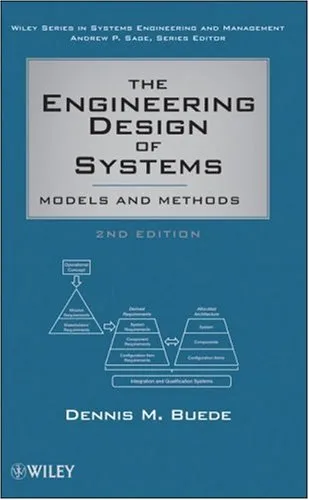The Engineering Design of Systems: Models and Methods
4.5
بر اساس نظر کاربران

شما میتونید سوالاتتون در باره کتاب رو از هوش مصنوعیش بعد از ورود بپرسید
هر دانلود یا پرسش از هوش مصنوعی 2 امتیاز لازم دارد، برای بدست آوردن امتیاز رایگان، به صفحه ی راهنمای امتیازات سر بزنید و یک سری کار ارزشمند انجام بدینکتاب های مرتبط:
خلاصهای جامع از کتاب "The Engineering Design of Systems: Models and Methods"
کتاب "The Engineering Design of Systems: Models and Methods" نوشتهی دنیس ام باده، یکی از مهمترین منابع موجود در زمینه طراحی مهندسی سیستمهاست. این کتاب به بررسی عمیق مدلها و روشهای مختلفی میپردازد که در فرآیند طراحی سیستمها بهرهبرداری میشود. با توجه به کاربرد گسترده این موضوع در صنایعی مانند فضا، حمل و نقل، و فناوری اطلاعات، این کتاب یک راهنمای اساسی برای مهندسان، دانشجویان و تمامی علاقهمندان به حوزه سیستمها محسوب میشود.
نکات کلیدی کتاب
- تأکید بر استفاده از مدلهای متعدد در تجزیه و تحلیل و طراحی سیستمها.
- بررسی روشهای مختلفی مانند Integrated Product Team (IPT) و Systems Engineering Process (SEP).
- توضیح چگونگی تلفیق علوم مهندسی مختلف در طراحی سیستمهای پیچیده.
- بحث در خصوص مدیریت پروژه، ریسکها و منابع در طول چرخه حیات سیستم.
نقلقولهای معروف از کتاب
"A system is more than the sum of its parts; it is defined by the interactions and relationships between those parts."
"Models and simulations are powerful tools, but they require the insights and expertise of engineers to become transformative."
چرا این کتاب اهمیت دارد
کتاب "The Engineering Design of Systems: Models and Methods" با ارائه اصول و فنون جامع و معتبری در زمینه طراحی سیستمها، اهمیت زیادی در بهبود فرآیندهای طراحی پیچیده و افزایش کارایی سیستمها دارد. این کتاب نه تنها تئوریهای متعددی را بیان میکند، بلکه از طریق مثالهای عملی به خواننده کمک میکند تا این تئوریها را در زمینه واقعی پیادهسازی نماید. با توجه به رشد سریع فناوری و پیچیدگی فزاینده سیستمها در دنیای مدرن، تسلط بر مفاهیم ارائهشده در این کتاب برای مهندسین و مدیران سیستمها بسیار حیاتی است.
Introduction
Welcome to "The Engineering Design of Systems: Models and Methods," a comprehensive guide that has been thoughtfully curated to provide a profound understanding of the intricate process of systems engineering. This book serves as an essential resource for practitioners, scholars, and students in the field of systems engineering, offering a detailed exploration of the methodologies and theoretical frameworks that underpin successful system design.
Detailed Summary of the Book
The book meticulously delves into the realms of engineering design, presenting a structured overview of systems engineering with an emphasis on models and methods pivotal to designing complex systems. The primary intent of this work is to equip readers with a robust set of tools and methodologies needed to approach and resolve system design challenges efficiently.
Initially, the book outlines fundamental concepts, laying a foundation of system engineering principles that anchor further discussions. This foundation paves the way for an in-depth exploration of more sophisticated design processes. Attention is given to modern engineering practices, detailing model-based systems engineering (MBSE) approaches that embrace complexity through structured modeling techniques.
The narrative unfolds progressively, leading readers through the lifecycle of systems engineering design, from initial conceptualization and needs definition to detailed design, validation, and implementation phases. In doing so, the book bridges theoretical concepts with practical application, making it a vital tool for solving real-world engineering problems.
Key Takeaways
- Comprehensive understanding of systems engineering and model-based design approaches.
- Insight into the complete lifecycle of engineering design, from conception to deployment.
- Detailed methodologies for tackling complex design challenges using structured approaches.
- Integration of theoretical concepts with practical examples for enhanced learning and application.
Famous Quotes from the Book
"Design is not just what it looks like and feels like. Design is how it works."
"System design is at the heart of engineering, creating solutions that are intelligent, efficient, and sustainable."
Why This Book Matters
The importance of "The Engineering Design of Systems: Models and Methods" cannot be overstated in today's complex engineering landscape. As systems continue to grow in scale and complexity, the necessity for structured and methodical engineering design becomes paramount. This book empowers its readers with the skills to navigate this complexity effectively, positioning them to design systems that are not only functional but also resilient and adaptable to future challenges.
Moreover, the book stands as a testament to the evolving nature of engineering practices, highlighting the shift towards model-based approaches that harness contemporary tools and technologies. By doing so, it ensures that readers are well-equipped to contribute to and lead in the dynamic field of systems engineering.
دانلود رایگان مستقیم
شما میتونید سوالاتتون در باره کتاب رو از هوش مصنوعیش بعد از ورود بپرسید
دسترسی به کتابها از طریق پلتفرمهای قانونی و کتابخانههای عمومی نه تنها از حقوق نویسندگان و ناشران حمایت میکند، بلکه به پایداری فرهنگ کتابخوانی نیز کمک میرساند. پیش از دانلود، لحظهای به بررسی این گزینهها فکر کنید.
این کتاب رو در پلتفرم های دیگه ببینید
WorldCat به شما کمک میکنه تا کتاب ها رو در کتابخانه های سراسر دنیا پیدا کنید
امتیازها، نظرات تخصصی و صحبت ها درباره کتاب را در Goodreads ببینید
کتابهای کمیاب یا دست دوم را در AbeBooks پیدا کنید و بخرید
1498
بازدید4.5
امتیاز0
نظر98%
رضایتنظرات:
4.5
بر اساس 0 نظر کاربران
Questions & Answers
Ask questions about this book or help others by answering
No questions yet. Be the first to ask!















